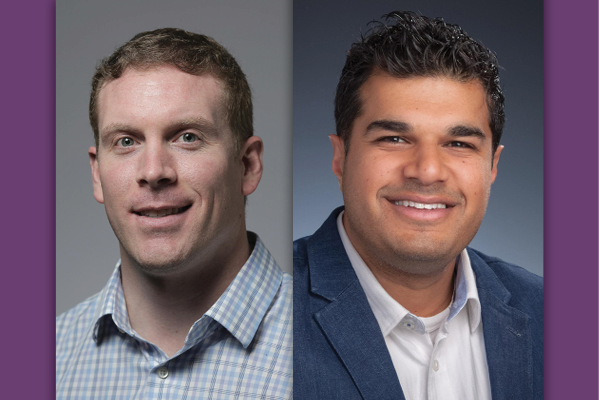
Products have flooded the marketplace that purport to make a person appear younger. Anti-aging creams and serums line store shelves, and if that’s not enough, there’s always Botox or facelifts, liposuction, cool sculpting, or implants. But what if the key to reversing aging is…blood?
In researched published in Cell Metabolism, James White, PhD, assistant professor in medicine and cell biology; Gurpreet Baht, PhD, assistant professor in orthopedic surgery and pathology; and team show that biological age —the pace in which a body has aged for every year of life— is fluid, and while it can age faster under stress, it can also be restored once those stressors are eliminated.
First, the team used a heterochronic parabiosis mouse model, in which the blood vessels of a young mouse were connected to an older mouse, so they shared blood circulation. While the older mouse slowed its pace of aging when connected, the younger mouse aged more quickly. “When we separate them and remove the old circulation,” White said, “the young mouse is able to reverse that accelerated aging and go back to its chronological age.”
To determine the biological ages of the mice, the team used DNA methylation clocks. Experiences and environmental exposures leave little signatures on our DNA, and those signatures, or methylation marks, accumulate and can help scientists measure how fast or slow a person or animal is aging.
The team looked at the liver, heart, brain, kidney, and fat tissues of the mouse models two months after completing parabiosis, and using a variety of DNA methylation clocks, determined that all young mice aged faster when exposed to old blood and reversed back to baseline age after separation and recovery.
“We show evidence for a reversal of biological aging,” White said. “The young mice, which showed accelerated biological age with exposure from aged circulation, were able to reverse this process and return back to their chronological age after the old circulation was gone.”
Obviously, it’s not exactly natural to be surgically attached via blood vessels to another living creature, so the team wondered whether the same fluctuation in biological aging could be true without sharing old blood.
In collaboration with Harvard University, they analyzed human cohorts of stress that included chronic illness, surgery, and pregnancy. Using DNA methylation clocks on blood samples, they found that aging can accelerate during these stressful events, but when the stressors are removed, aging can decelerate.
“This is the first time in in vivo human cohorts that we were able show the pace of aging isn’t just Father Time,” White said. “It accelerates, and hopefully, decelerates over time.”
This held true for patients needing emergency surgical repair for a traumatic hip fracture. Blood samples were taken before surgery, one day after surgery, and before patients were discharged from the hospital. The team found a significant increase in biological age markers in the first 24 hours of hospital admittance, but by the time they were discharged, patients’ biological ages dropped, even though many of these patients were in their 70s and 80s.
Interestingly, the same was not true for patients who elected to have hip replacement surgery. Without the trauma of an injury, biological aging was not affected.
COVID-19 patients who ended up in the intensive care unit also aged more rapidly during their illness. It’s important to note that blood samples were not taken from these patients prior to their admittance to the ICU, so the team used DNA methylation clocks to analyze their biological age while in the ICU and compared that to their biological age after they recovered. “We saw varying results but generally trending back to recovery,” White said.
This begs the question: Is there a point of no return? In other words, can a person’s pace of aging increase so much because of an acute injury; lifestyle choice, such as smoking or drinking; or maybe even mental health trauma that they can’t fully “go back in time” and reverse it?
The short answer: we don’t know yet.
“Our next steps,” White said, “are to figure out the triggers of why different responses drive acceleration or deceleration of aging.” White wants to explore whether it’s only physical injury or illness and recovery that can accelerate and decelerate aging, or whether other factors, such as depression and mental illness, can also accelerate aging. And if so, can aging decelerate if those mental health issues are resolved?
“I think the tissues and cells respond to their environment,” White said. “So, in theory, if we can convince the cells they are young and take out stressors, maybe we can push off aging a while longer.”
More genomics news available at Precision Genomics Collaboratory
More Coverage
Here's how you can reverse your biological age, according to a new study | BBC Science Focus